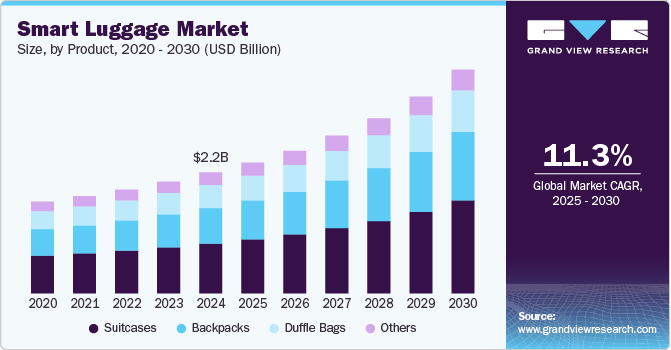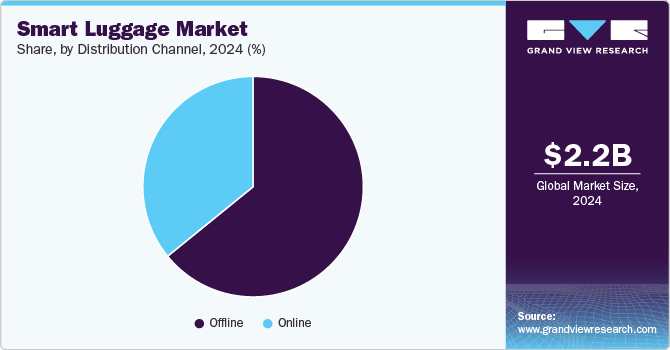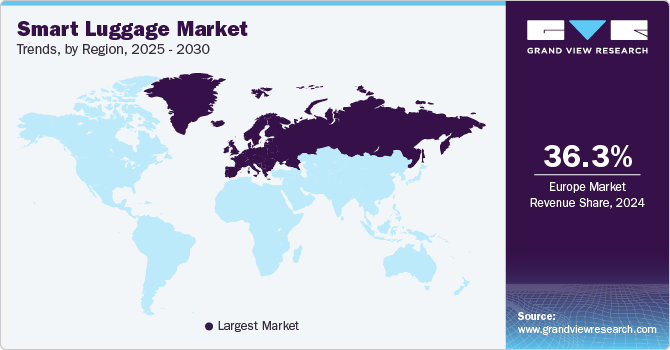- Home
- »
- Clothing, Footwear & Accessories
- »
-
Smart Luggage Market Size, Share, Industry Report, 2030GVR Report cover
![Smart Luggage Market Size, Share & Trends Report]()
Smart Luggage Market (2025 - 2030) Size, Share & Trends Analysis Report By Product (Suitcases, Backpacks, Duffle Bags), By Material, By Connectivity, By Distribution Channel (Online, Offline), By Region, And Segment Forecasts
- Report ID: GVR-4-68040-494-8
- Number of Report Pages: 100
- Format: PDF
- Historical Range: 2018 - 2024
- Forecast Period: 2025 - 2030
- Industry: Consumer Goods
- Report Summary
- Table of Contents
- Segmentation
- Methodology
- Download FREE Sample
-
Download Sample Report
Smart Luggage Market Summary
The global smart luggage market size was estimated at USD 2.24 billion in 2024 and is projected to reach USD 4.14 billion by 2030, growing at a CAGR of 11.3% from 2025 to 2030. The market growth is attributed to several factors that cater to the evolving needs of modern travelers.
Key Market Trends & Insights
- The smart luggage industry in North America held over 28.43% share of the global revenue in 2024.
- smart luggage industry in Europe accounted for a revenue share of 36.25% of the global revenue in 2024.
- By product, the smart suitcase market segment accounted for a revenue share of 41.19% in 2024.
- By material, nylon accounted for a global revenue share of 39.41% in 2024.
- By connectivity, the Wi-Fi connectivity accounted for a revenue share of 45.70% in 2024.
Market Size & Forecast
- 2024 Market Size: USD 2.24 Billion
- 2030 Projected Market Size: USD 4.14 Billion
- CAGR (2025-2030): 11.3%
- North America: Largest market in 2024
- Asia Pacific: Fastest growing market
One of the primary drivers is technological innovation, as smart luggage is equipped with features such as GPS tracking, digital locks, USB charging ports, and built-in scales. These features offer significant convenience by solving common travel issues like locating lost luggage or managing overpacking. The integration of Bluetooth connectivity, RFID blocking, and app-based control systems further enhances the appeal of these products to tech-savvy consumers who prioritize seamless travel experiences. Another significant factor contributing to the growth of the smart luggage industry is the increased demand for convenience. Travelers today are looking for solutions that simplify their journeys, and smart luggage offers practical features such as self-weighing bags and remote locking mechanisms. This is especially appealing to frequent flyers and business travelers who prioritize efficiency and time-saving options while navigating airports and transit points. As the travel industry rebounds post-pandemic, the demand for innovative, tech-driven travel accessories has surged, with smart luggage being a key beneficiary.
Rising travel and tourism have also fueled the demand for smart luggage. As international travel resumes and continues to grow, consumers are seeking high-quality, technologically advanced luggage that ensures ease and security throughout their trips. The travel boom has especially driven demand for luggage equipped with security features like biometric locks and location tracking, which align with the growing concern for personal belongings’ safety while traveling. Additionally, many brands are tapping into sustainability trends by using eco-friendly materials, which appeals to environmentally conscious consumers looking for durable and responsible travel products.
Moreover, the rise of e-commerce has made smart luggage more accessible than ever before. Online retail platforms provide customers with a wide array of choices, price ranges, and reviews, helping them make informed decisions about their purchases. The convenience of online shopping, combined with the growing interest in high-tech travel gear, has been instrumental in boosting the smart luggage market. Furthermore, business travelers are increasingly adopting smart luggage, attracted by its organizational features, power banks, and tracking capabilities, which are ideal for fast-paced, frequent travel. These trends and factors combined are leading to the market expansion as travelers increasingly seek out innovative solutions that enhance their travel experience.
Product Insights
The smart suitcase market segment accounted for a revenue share of 41.19% in 2024. Smart suitcases come with features such as built-in USB chargers, digital locks, and self-weighing capabilities, offering travelers greater convenience during their trips. These tech-savvy solutions address common travel hassles, making smart suitcases an attractive option for modern travelers. Many smart suitcases are equipped with features like GPS tracking, remote locking, and biometric scanners, which enhance security. Travelers are increasingly concerned about protecting their luggage, and these features provide peace of mind, especially during international travel.
The smart backpacks segment is expected to grow at a CAGR of 12.0% from 2025 to 2030. Smart backpacks are lightweight and easy to carry, making them ideal for commuters, students, and travelers who prioritize mobility. The built-in tech features, such as USB charging ports and RFID protection, add convenience, making them a popular choice for people on the go. With integrated features like charging capabilities, anti-theft locks, and GPS tracking, smart backpacks cater to the growing need for staying connected and secure while traveling. These features are particularly attractive to digital nomads, students, and business professionals.
Material Insights
Nylon accounted for a global revenue share of 39.41% in 2024. Nylon is known for its high strength-to-weight ratio, making nylon luggage both durable and lightweight. Travelers prefer this material as it offers strong protection for their belongings while being easy to carry or wheel around, especially during long journeys. The flexible nature of nylon allows for a range of designs and expandable compartments, making it ideal for travelers looking for versatile luggage with added storage capacity. This flexibility caters to various travel needs, from short trips to long-haul vacations.
The smart plastic luggage market segment is expected to grow at a CAGR of 12.3% from 2025 to 2030. Hard plastic materials like polycarbonate and ABS used in smart luggage offer excellent durability and impact resistance, providing strong protection for valuables. Travelers prefer plastic luggage for its ability to withstand rough handling during travel. Despite being tough, many plastic smart luggage options are lightweight, making them easy to maneuver. This appeals to travelers who want sturdy yet lightweight luggage for convenience, especially during air travel, where weight limits matter.
Connectivity Insights
Wi-Fi connectivity accounted for a revenue share of 45.70% in 2024. Wi-Fi-enabled smart luggage offers features like remote locking, built-in GPS, and notifications for overweight bags. These conveniences make it particularly attractive for frequent flyers and business travelers who value efficiency during their journeys. Many Wi-Fi-33 smart luggage options come with mobile apps that allow travelers to monitor battery levels, control locks, and track locations remotely. This seamless integration with smartphones appeals to tech-savvy consumers seeking more control and convenience.
GPS connectivity is expected to grow at a CAGR of 11.8% from 2025 to 2030. GPS technology allows travelers to monitor the exact location of their luggage in real time, reducing the risk of lost or delayed baggage. This feature is highly appealing to those concerned about luggage safety, particularly during long or multi-stop trips. As international travel increases, more consumers are investing in advanced luggage solutions like GPS-enabled bags. The growing awareness of luggage tracking technology, coupled with the desire for seamless and secure travel, is driving demand for these products.
Distribution Channel Insights
The sales of smart luggage through offline channels accounted for a revenue share of 64.14% of the global revenue in 2024. Many consumers prefer to physically examine luggage before purchasing. Offline retail stores allow customers to assess the quality, feel the materials, and test features like wheels, handles, and locks, which can influence their purchasing decisions. In-store shopping provides access to knowledgeable staff who can offer personalized assistance and recommendations. Customers can ask questions about features, compare different options, and receive expert advice, enhancing their overall shopping experience.

The sales of smart luggage through online channels are expected to grow at a CAGR of 13.6% from 2025 to 2030. Online platforms provide travelers with the convenience of browsing and purchasing smart luggage from the comfort of their homes. This ease of access encourages consumers to explore and compare various brands and features, leading to higher sales. E-commerce platforms typically offer a broader range of smart luggage options than physical stores. Shoppers can find various styles, sizes, and technologies, allowing them to select luggage that best meets their needs without geographical limitations.
Regional Insights
The smart luggage industry in North America held over 28.43% share of the global revenue in 2024. North America has a large population of tech-savvy consumers who are early adopters of innovative products. Smart luggage, with features like GPS tracking, built-in chargers, and remote locking, appeals to this audience by offering convenience and seamless travel experiences. As travel and tourism continue to recover and grow in the region, particularly with the return of business travel and leisure trips, travelers are seeking modern, efficient luggage solutions. Smart luggage addresses these needs by offering advanced features that make travel more convenient and secure.
U.S. Smart Luggage Market Trends
The smart luggage industry in the U.S. is facing intense competition due to innovation in smart luggage varieties. Travelers in the U.S. are increasingly concerned about the safety of their belongings, especially during air travel. Smart luggage, with features like GPS tracking, digital locks, and biometric security, provides enhanced protection, making it an appealing option for security-conscious travelers. The rise of e-commerce platforms in the U.S. has made smart luggage more accessible to a wider audience. Online shopping offers consumers a range of smart luggage options, price comparisons, and customer reviews, fueling the demand for high-tech travel gear across the region.
Europe Smart Luggage Market Trends
The smart luggage industry in Europe accounted for a revenue share of 36.25% of the global revenue in 2024. European travelers often seek efficient travel solutions that enhance their overall experience. Smart luggage features, such as built-in GPS tracking, USB charging ports, and self-weighing capabilities, provide significant convenience, making travel easier and more enjoyable. As European travel continues to grow, particularly with a strong emphasis on both business and leisure trips, there is a heightened demand for innovative luggage solutions. Smart luggage caters to frequent travelers who prioritize modern, functional, and secure options.

Asia Pacific Smart Luggage Market Trends
The smart luggage industry in Asia Pacific is expected to grow at a CAGR of 12.1% from 2025 to 2030. The Asia Pacific region has seen significant urbanization and the rise of the middle class with increased disposable income. As more people can afford to travel, there is a growing demand for modern, convenient luggage solutions like smart luggage, which enhances the travel experience. The expansion of low-cost airlines and improved connectivity within the region has led to a surge in air travel. Travelers are looking for efficient and innovative luggage solutions that can simplify their journeys, making smart luggage an attractive option for frequent flyers.
Key Smart Luggage Company Insights
The smart luggage market is characterized by dynamic competitive dynamics shaped by a combination of factors, including product innovation, regional production capabilities, and evolving consumer preferences. Leading manufacturers invest in R&D and technological advancements to provide cost-effective, quality products.
Market players are entering into joint ventures, partnerships, mergers, agreements, and acquisitions to strengthen their market position and expand their geographical reach. Companies are also focusing on raising consumer awareness of the ambiguity of the ingredients used while strictly adhering to international regulatory standards.
Key Smart Luggage Companies:
The following are the leading companies in the smart luggage market. These companies collectively hold the largest market share and dictate industry trends.
- Rimowa
- Samsonite International S.A.
- Tumi Holdings, Inc.
- Away Travel, Inc.
- Bluesmart, Inc.
- G-RO, LLC
- Arlo Skye Inc.
- Travelpro International, Inc.
- Delsey Paris
- Samsara Luggage, Inc.
Recent Developments
- In July 2024, Arista Vault, a leader in smart luggage technology, unveiled its latest innovation, the JARVIZ, which promises to revolutionize travel. This cutting-edge suitcase is designed to follow its owner effortlessly, making travel more convenient and enjoyable.
Smart Luggage Market Report Scope
Report Attribute
Details
Market size value in 2025
USD 2.42 billion
Revenue forecast in 2030
USD 4.14 billion
Growth rate
CAGR of 11.3% from 2025 to 2030
Actual data
2018 - 2024
Forecast period
2025 - 2030
Report updated
April 2025
Quantitative units
Revenue in USD million/billion and CAGR from 2025 to 2030
Report coverage
Revenue forecast, company ranking, competitive landscape, growth factors, and trends
Segments covered
Product, material, connectivity, distribution channel, region
Regional scope
North America; Europe; Asia Pacific; Central & South America; Middle East & Africa
Country scope
U.S.; Canada; Mexico; UK; Germany; France; Italy; Spain; China; Japan; India; South Korea; Australia & New Zealand; Brazil; South Africa
Key companies profiled
Rimowa; Samsonite International S.A.; Tumi Holdings, Inc.; Away Travel, Inc.; Bluesmart, Inc.; G-RO, LLC; Arlo Skye Inc.; Travelpro International, Inc.; Delsey Paris; Samsara Luggage, Inc.
Customization scope
Free Report customization (equivalent up to 8 analysts working days) with purchase. Addition or alteration to country, regional & segment scope.
Pricing and purchase options
Avail customized purchase options to meet your exact research needs. Explore purchase options. Global Smart Luggage Market Report Segmentation
This report forecasts revenue growth at the global, regional, and country levels and provides an analysis of the latest industry trends and opportunities in each of the sub-segments from 2018 to 2030. For the purpose of this study, Grand View Research has segmented the global smart luggage market report based on product, material, connectivity, distribution channel, and region:
-
Product Outlook (Revenue, USD Million, 2018 - 2030)
-
Suitcases
-
Backpacks
-
Duffle Bags
-
Others
-
-
Material Outlook (Revenue, USD Million, 2018 - 2030)
-
Nylon
-
Leather
-
Plastic
-
Others
-
-
Connectivity Outlook (Revenue, USD Million, 2018 - 2030)
-
GPS
-
WI-FI
-
Bluetooth
-
-
Distribution Channel Outlook (Revenue, USD Million, 2018 - 2030)
-
Online
-
Offline
-
-
Regional Outlook (Revenue, USD Million, 2018 - 2030)
-
North America
-
U.S.
-
Canada
-
Mexico
-
-
Europe
-
UK
-
France
-
Germany
-
Spain
-
Italy
-
-
Asia Pacific
-
China
-
Japan
-
India
-
South Korea
-
Australia & New Zealand
-
-
Central & South America
-
Brazil
-
-
Middle East & Africa
-
South Africa
-
-
Share this report with your colleague or friend.
Need a Tailored Report?
Customize this report to your needs — add regions, segments, or data points, with 20% free customization.

ISO 9001:2015 & 27001:2022 Certified
We are GDPR and CCPA compliant! Your transaction & personal information is safe and secure. For more details, please read our privacy policy.
Trusted market insights - try a free sample
See how our reports are structured and why industry leaders rely on Grand View Research. Get a free sample or ask us to tailor this report to your needs.










